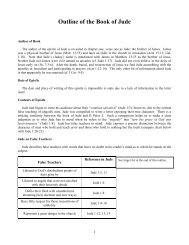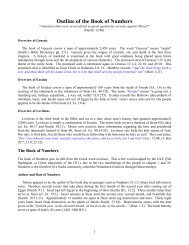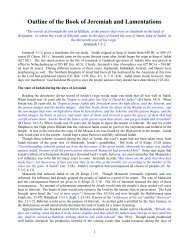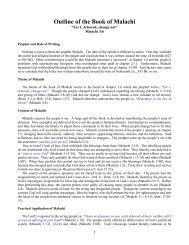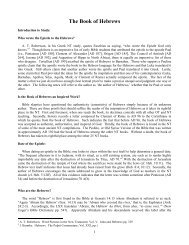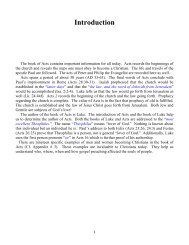Outline of the Book of I Timothy - The Floral Heights Church of Christ
Outline of the Book of I Timothy - The Floral Heights Church of Christ
Outline of the Book of I Timothy - The Floral Heights Church of Christ
You also want an ePaper? Increase the reach of your titles
YUMPU automatically turns print PDFs into web optimized ePapers that Google loves.
identified <strong>the</strong> elders <strong>of</strong> Ephesus as <strong>the</strong> "bishops" at Acts 20:28. Let us note three things about <strong>the</strong><br />
bishop before we identify who he is:<br />
a. First, note that <strong>the</strong> bishop in <strong>the</strong> church is an "<strong>of</strong>fice" (a position <strong>of</strong> authority, duty, or trust).<br />
Though this word is not found in many manuscripts <strong>the</strong> idea is certainly <strong>the</strong>re as we shall see).<br />
b. Secondly, notice that those who become bishops do so because <strong>the</strong>y "seek" or "aspire" <strong>the</strong><br />
<strong>of</strong>fice. <strong>The</strong> word "seek" (oregetai) = "to extend, stretch out... to reach forward to... to desire<br />
earnestly... long after" (Moulton 291). Recall that <strong>the</strong>re were unqualified men who "desired"<br />
<strong>the</strong> place <strong>of</strong> a teacher at I <strong>Timothy</strong> 1:7; however, <strong>the</strong> <strong>of</strong>fice <strong>of</strong> <strong>the</strong> bishop will not be filled with<br />
such men. <strong>The</strong> bishop comes into <strong>of</strong>fice not on accident or because he is old but ra<strong>the</strong>r he is<br />
<strong>the</strong>re because it is a life long goal that has been achieved.<br />
c. Lastly, note that those who seek after <strong>the</strong> <strong>of</strong>fice <strong>of</strong> a bishop "desires a good work." Why is <strong>the</strong><br />
<strong>of</strong>fice <strong>of</strong> a bishop a "good work?" Bishops will be responsible for <strong>the</strong> souls <strong>of</strong> any given local<br />
church and <strong>the</strong>reby <strong>the</strong>re is no higher calling or work than <strong>the</strong>irs upon this earth (Heb. 13:17).<br />
2. Let us now identify <strong>the</strong> "bishop." Let us examine three words that <strong>the</strong> New Testament reveals to be<br />
<strong>the</strong> same <strong>of</strong>fice in <strong>the</strong> book <strong>of</strong> Acts 20:17-28.<br />
a. "Bishop" (episkopos) = "an inspector, overseer; a watcher, guardian... oversight" (Moulton<br />
160). We find this term used at Acts 20:28; Phil. 1:1; Titus 1:7. Here is one who is<br />
figuratively looking over <strong>the</strong> shoulder <strong>of</strong> <strong>the</strong> members <strong>of</strong> <strong>the</strong> church to make sure that all is<br />
right in <strong>the</strong> <strong>Christ</strong>ian's life. Though many do not like to be so watched God none<strong>the</strong>less<br />
authorized such a position in <strong>the</strong> church.<br />
b. <strong>The</strong> word "elder" (presbuteros) is equated to <strong>the</strong> <strong>of</strong>fice <strong>of</strong> bishop at Acts 20:17-28. This Greek<br />
word is defined as "elder, senior; older, more advanced in years... person advanced in years"<br />
(Moulton 340). Those advanced in years have much more life experience and understanding <strong>of</strong><br />
God's word to perform <strong>the</strong> act <strong>of</strong> inspecting, watching, and exercising oversight <strong>of</strong> <strong>the</strong> church.<br />
c. Lastly, <strong>the</strong> word "pastor" (poimen) is equated to <strong>the</strong> <strong>of</strong>fice <strong>of</strong> a bishop at Acts 20:17-28. <strong>The</strong><br />
pastor is “a herdsman or shepherd... metaph. a shepherd <strong>of</strong> <strong>the</strong> people, a captain, chief”<br />
(LS 652).<br />
3. <strong>The</strong>se three terms illustrate <strong>the</strong> work, objective, and God's expectation <strong>of</strong> this <strong>of</strong>fice. <strong>The</strong> "bishop"<br />
is an older man in <strong>the</strong> church that is to be viewed as a chief or shepherd among <strong>the</strong> saints <strong>of</strong> a local<br />
church who is responsible for watching, inspecting, guarding, and overseeing God's people. <strong>The</strong>se<br />
terms give a fearful description <strong>of</strong> <strong>the</strong> grave responsibility <strong>the</strong>se men have. <strong>The</strong> overall picture is<br />
that <strong>of</strong> a man <strong>of</strong> age who cares enough about God's people to watch over <strong>the</strong>m so that no evil<br />
befalls <strong>the</strong>m (see Heb. 13:17).<br />
B. "<strong>The</strong> bishop <strong>the</strong>refore must be without reproach, <strong>the</strong> husband <strong>of</strong> one wife, temperate, sober-minded,<br />
orderly, given to hospitality, apt to teach;" (3:2).<br />
1. Not any older man in <strong>the</strong> church with supervisory skills is qualified to serve as a bishop. Paul<br />
outlines <strong>the</strong> qualifications to <strong>Timothy</strong> (as he did with Titus at Crete / Titus 1:6ff).<br />
2. <strong>The</strong> bishop "must be" (dei) = "it is binding, it is necessary, it behooves, it is proper; it is<br />
inevitable" (Moulton 89). <strong>The</strong>re are no if, ands, or buts when it comes to <strong>the</strong> qualification <strong>of</strong> <strong>the</strong><br />
bishop. Paul states that <strong>the</strong>y "MUST" meet <strong>the</strong> following qualifications:<br />
a. First, <strong>the</strong> bishop must be, "Without reproach" (anepilempton) = "not to be laid hold <strong>of</strong>; met.<br />
irreprehensible (perfect, flawless, without fault), un-blamable" (Moulton 28). Paul uses <strong>the</strong><br />
word "blameless" (anegkletos) at Titus 1:6 meaning “not arraigned (have a charge <strong>of</strong> sin<br />
against one so that <strong>the</strong>y are called to give account / jcr); un-blamable, irreproachable” (Moulton<br />
27). <strong>The</strong> one who will be considered as an elder <strong>of</strong> <strong>the</strong> body <strong>of</strong> <strong>Christ</strong> cannot have something<br />
in his past or at present that questions his fellowship with God and <strong>the</strong> brethren. <strong>The</strong> one who<br />
would serve as an elder must stand undefiled before Jehovah and this is certainly possible for<br />
everyone through <strong>the</strong> blood <strong>of</strong> Jesus <strong>Christ</strong>. No un-forgiven sinner can possibly stand before<br />
<strong>the</strong> church as an elder. It stands to reason <strong>the</strong>n that an elder who will not repent <strong>of</strong> any given<br />
sin through a heart <strong>of</strong> stubbornness is certainly disqualified to serve in this high <strong>of</strong>fice.<br />
b. Secondly, <strong>the</strong> elder must be "<strong>the</strong> husband <strong>of</strong> one wife" (mias gunaikos). <strong>The</strong> Greek word mias<br />
simply means one "to <strong>the</strong> exclusion <strong>of</strong> o<strong>the</strong>rs" (Vines 809) or as Liddell and Scott say, "one"<br />
(LS 512). Paul is saying that <strong>the</strong> elder is to live in a scriptural marriage just as any o<strong>the</strong>r<br />
17



